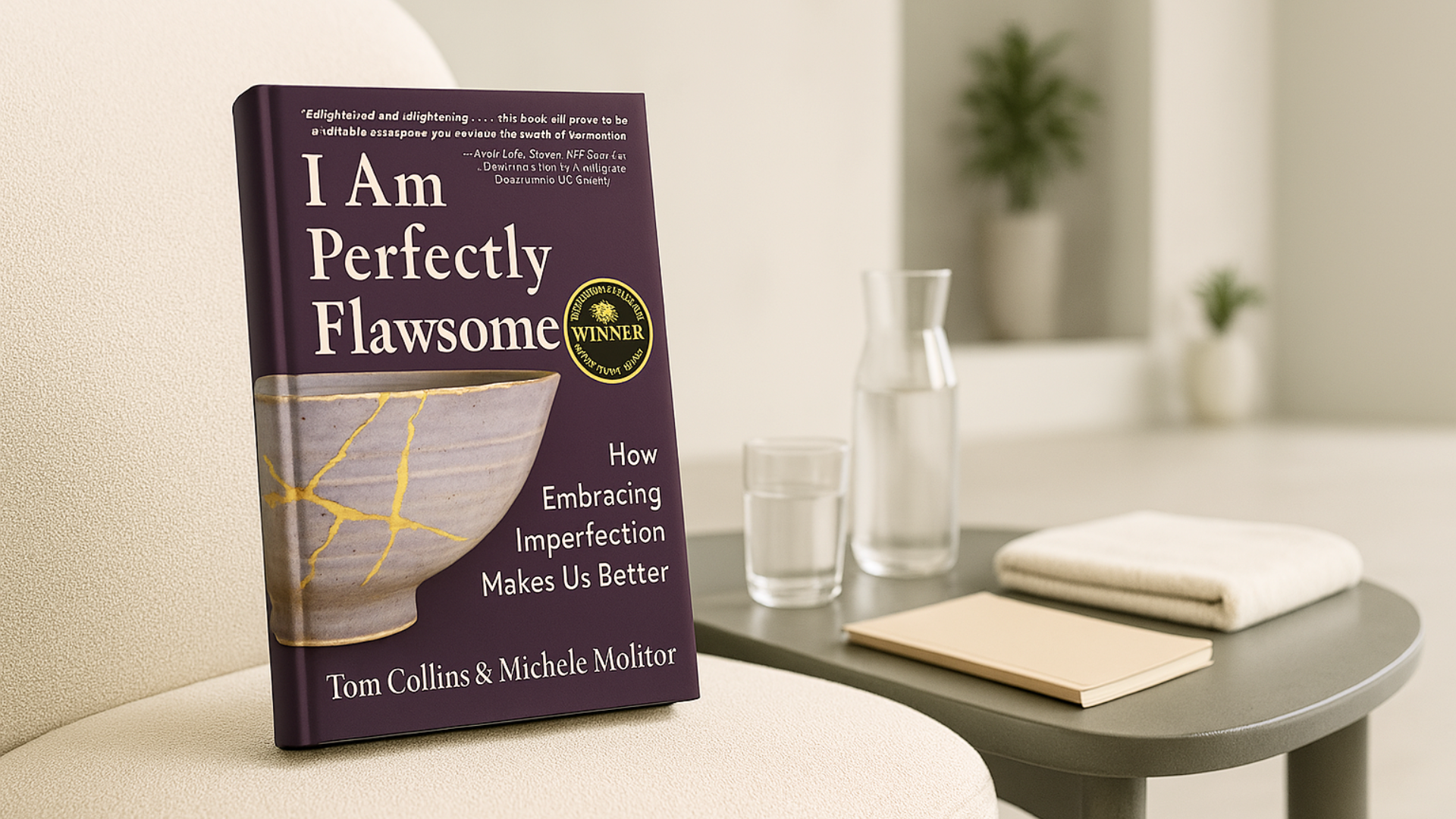How to Be Perfectly Imperfect and Still Do Great Work

Book Review: I Am Perfectly Flawsome by Tom Collins and Michele Molitor
A practical and compassionate guide to overcoming perfectionism and embracing the beautifully imperfect self
In I Am Perfectly Flawsome, Tom Collins and Michele Molitor offer a candid and deeply affirming guide for anyone caught in the trap of perfectionism. With a blend of personal storytelling, cultural insight, scientific research, and gentle humour, the authors invite readers to shed the myth of flawlessness and step into a more human, joyful way of being.
This book is not about lowering standards. It is about realigning them with reality, dignity, and the possibility of excellence without shame. By embracing what they call “Flawsomism,” Collins and Molitor challenge the cultural obsession with perfection and offer a mindset shift grounded in self-compassion and growth.
What the book promises
The authors promise to help readers recognize the damaging effects of perfectionism on mental, emotional, and physical health. They aim to replace self-critical patterns with a more resilient, realistic, and empowering way of thinking. This new approach, Flawsomism, is defined as the pursuit of continuous improvement while fully accepting and even celebrating one’s imperfections.
At its core, the book offers permission to be human. It reframes imperfection not as failure, but as the soil from which creativity, connection, and authenticity grow.
What the book delivers
Collins and Molitor deliver on their promise with honesty, warmth, and structure. They open the book with their own stories of perfectionism’s grip, offering examples from personal and professional life that feel both relatable and revealing. From law and leadership to parenting and burnout, the stories span decades and show how perfectionism is not only common, but also often invisible until it begins to unravel our health, relationships, and self-worth.
The book is structured around ten thematic chapters, covering everything from perfectionism’s roots in childhood to its modern expression through social media, workplace expectations, and even AI. Chapters like “Wabi-Sabi in the Workplace” and “Advanced Adulting” bring fresh perspective to familiar struggles, while others offer practical tools for change. Throughout, journal prompts and reflection questions support readers in applying what they’ve learned.
One of the book’s standout contributions is its exploration of perfectionism’s intergenerational and epigenetic roots. Rather than blaming individuals for their internalised beliefs, the authors trace patterns across families, cultures, and institutions. This broader lens helps reduce shame while offering concrete entry points for healing.
Style and structure
The book is written in an open, conversational style that feels like sitting down with two experienced and kind-hearted guides. Both Collins and Molitor write with humility and humour, often poking gentle fun at their former perfectionist selves. This tone makes difficult material feel manageable and even uplifting.
Chapters are organized clearly and consistently. Each one includes research, personal anecdotes, cultural references, and reflection prompts. The layout is spacious and reader-friendly, with wide margins that encourage annotation. This makes the book highly usable as both a solo journey and a book club or coaching resource.
The use of Japanese philosophy, especially kintsugi and wabi-sabi, adds depth and resonance to the core message. These metaphors reinforce the idea that healing and strength are found not in hiding cracks, but in honouring them.
Where the book shines
I Am Perfectly Flawsome shines in its ability to name and dismantle the hidden costs of perfectionism without shaming the reader. The authors do not pathologize perfectionists. Instead, they treat perfectionism as a learned response to insecurity, comparison, and unattainable standards. This approach is especially effective for high achievers who may have succeeded in external ways while struggling internally.
Their concept of “Flawsomism” is more than clever wordplay. It becomes a working philosophy for life, one that embraces contradiction, imperfection, and the pursuit of meaningful growth. Readers are encouraged to let go of the need to be flawless and instead focus on being fully engaged and honest in their efforts.
The book also excels at integrating science and story. Research on epigenetics, trauma, and social psychology is presented clearly and respectfully, alongside real-life examples from interviews and coaching work. This blend creates a narrative that feels both grounded and inspiring.
Notably, the chapters addressing women, parenting, and aging bring important nuance to how perfectionism shows up across life stages. The inclusion of diverse voices through quotes and surveys adds texture and relatability.
Light limitations
The book covers a wide range of topics, which is part of its charm. However, this breadth may feel slightly overwhelming for readers who are new to mindset work or seeking a more focused framework. While each chapter is well-crafted, some readers may prefer a clearer map through the material or a summary roadmap that ties all the pieces together.
Occasionally, the tone leans toward coaching language, which will resonate with many readers but may feel less familiar to those outside the personal development space. Still, the sincerity of the authors keeps it accessible.
Finally, readers looking for a more clinical or therapeutic guide to perfectionism may need to pair this book with additional support. This is not a diagnostic or treatment manual. It is a mindset manual written with care and clarity.
Final thoughts
I Am Perfectly Flawsome is a timely, thoughtful, and practical guide for anyone ready to break free from the trap of perfectionism. Tom Collins and Michele Molitor offer a compassionate path forward—one that honours effort, welcomes mistakes, and encourages each of us to show up as we are.
This book does not ask you to aim lower. It asks you to aim truer. It reminds you that your worth is not found in flawless performance but in the courage to keep showing up with heart, humour, and humanity.
Highly recommended for leaders, professionals, creatives, parents, and anyone feeling burnt out by the myth of perfection.